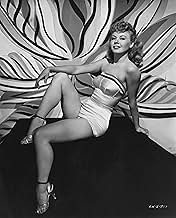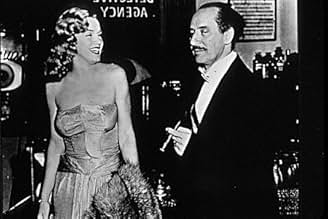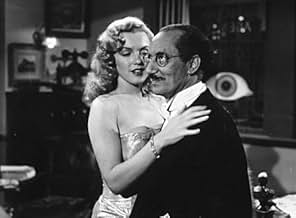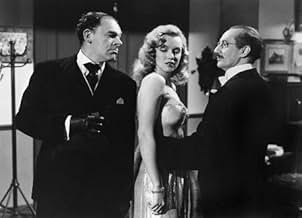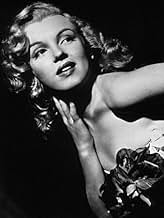VALUTAZIONE IMDb
5,8/10
3155
LA TUA VALUTAZIONE
Aggiungi una trama nella tua linguaThe Marx Brothers help young Broadway hopefuls while thwarting diamond thieves.The Marx Brothers help young Broadway hopefuls while thwarting diamond thieves.The Marx Brothers help young Broadway hopefuls while thwarting diamond thieves.
Herman Boden
- Dancer
- (non citato nei titoli originali)
Eddie Borden
- Man at Stage Door
- (non citato nei titoli originali)
Sayre Dearing
- Street Passerby
- (non citato nei titoli originali)
Joel Friend
- Dancer
- (non citato nei titoli originali)
Edward Gargan
- Cop Who Captures Harpo
- (non citato nei titoli originali)
Trama
Lo sapevi?
- QuizGroucho Marx told an anecdote - both on a '60s Today Show segment and in print - that the movie's producer asked three aspiring actresses to walk seductively past Marx. Whomever Marx decided was the best walker would play opposite him in the film. When the third girl walked past, Marx asked the producer, "How could you possibly choose anyone but that last one?" Marx had chosen Marilyn Monroe for the film.
- BlooperThe theatre's name changes from the Windsor to the Century and then back to the Windsor.
- Citazioni
Detective Sam Grunion, narrator of the story: I am the same Sam Grunion who solved the international uranium-mining swindle. Scotland Yard was baffled; the FBI was baffled. They sent for me and the case was solved immediately: I confessed.
- Versioni alternativeThe DVD version released in 2004 runs 91 minutes (despite what it says on the box) and contains several scenes not included in the 85 min. version long seen in the U.S.- 1.Harpo giving link sausages to the front man in a bull costume by threading them through a nostril in the bull head and handing the back end man a ham. 2. Groucho showing photos of himself in different disguises with Madame Egilichi and then providing voice-over narration for a scene of Chico trying to bribe Mr. Lyons by setting him up with a chorus girl. 3. Harpo being put through a washing machine by Madame Egilichi's henchmen. 4. Harpo becoming completely enveloped in smoke from the KOOL sign and ducking into an air vent which sucks away the smoke. This version is also missing a scene in which Groucho observes that the show would have been saved if Maggie had accepted the sardines Harpo gave her.
- ConnessioniFeatured in The Legend of Marilyn Monroe (1965)
- Colonne sonoreLove Happy
(1949)
by Ann Ronell
Sung during the opening credits by Marion Hutton (uncredited) with chorus and danced by Vera-Ellen (uncredited)
Dance reprise by Paul Valentine (uncredited)
Recensione in evidenza
"Love Happy" is remembered, primarily, as the last "Official" Marx Brothers film (they would all appear in brief vignettes in "The Story of Mankind", seven years later, but not as a team), but if the film were a baseball statistic, it would have an asterik (*), because it truly isn't a showcase of the brothers, together, but a comedy starring Harpo, with Chico in a supporting role, and Groucho doing narration, and making brief appearances, occasionally (rather like the "General Electric Theater" TV episode the brothers would do, in 1959, where Harpo and Chico played crooks with hearts of gold, and Groucho would make a surprise appearance at the finale, as their lawyer).
As a comedy, "Love Happy" is so-so, with Harpo providing some genuine laughs, particularly during an interrogation scene with villains Raymond Burr, Ilona Massey, Eric Blore, and Bruce Gordon, and in the rooftop finale, with Harpo offering the same kind of outrageous physical humor that he had demonstrated in the classic MGM comedies. But the rest of the plot, while mildly entertaining, is simply a musical variation of "Room Service", as an impoverished group of performers (headed by Paul Valentine and future star Vera-Ellen) struggle to put on a Broadway musical.
The back story of the film is possibly more entertaining than the movie, itself; Harpo had wanted to make a solo film throughout the forties, and had tinkered on the script for several years, while soliciting financial backing for the project. Chico, meanwhile, was running up huge gambling debts, as was often the case (while a brilliant card player, he was a notoriously bad gambler), and just as the Marxes had made "A Night in Casablanca", in 1946, to pay off his debts at that time, Harpo brought him into "Love Happy" to do the same. Unfortunately, the end of the decade was a depressed time for film making (with television making inroads into the ticket-buying public), and backers would only fund the project if all three brothers would appear in the movie.
Groucho, by now a genuine TV star, thanks to the "You Bet Your Life" quiz show, hated the script of "Love Happy", and had little desire to co-star in the film. He was, however, loyal to his brothers, and finally reached a compromise; he would only appear briefly, would not have to wear his trademark greasepaint eyebrows and mustache, and would have final approval of his dialog and the performers working with him. He could honestly say he helped 'discover' Marilyn Monroe, at an open audition (watching two other starlets walk across a stage, followed by Marilyn, when asked for his pick for a small role, he raised his eyebrows and quipped, "You're kidding, right?")
Be warned: While "Love Happy" is not terrible, it certainly is no "Night at the Opera", or "Duck Soup"!
As a comedy, "Love Happy" is so-so, with Harpo providing some genuine laughs, particularly during an interrogation scene with villains Raymond Burr, Ilona Massey, Eric Blore, and Bruce Gordon, and in the rooftop finale, with Harpo offering the same kind of outrageous physical humor that he had demonstrated in the classic MGM comedies. But the rest of the plot, while mildly entertaining, is simply a musical variation of "Room Service", as an impoverished group of performers (headed by Paul Valentine and future star Vera-Ellen) struggle to put on a Broadway musical.
The back story of the film is possibly more entertaining than the movie, itself; Harpo had wanted to make a solo film throughout the forties, and had tinkered on the script for several years, while soliciting financial backing for the project. Chico, meanwhile, was running up huge gambling debts, as was often the case (while a brilliant card player, he was a notoriously bad gambler), and just as the Marxes had made "A Night in Casablanca", in 1946, to pay off his debts at that time, Harpo brought him into "Love Happy" to do the same. Unfortunately, the end of the decade was a depressed time for film making (with television making inroads into the ticket-buying public), and backers would only fund the project if all three brothers would appear in the movie.
Groucho, by now a genuine TV star, thanks to the "You Bet Your Life" quiz show, hated the script of "Love Happy", and had little desire to co-star in the film. He was, however, loyal to his brothers, and finally reached a compromise; he would only appear briefly, would not have to wear his trademark greasepaint eyebrows and mustache, and would have final approval of his dialog and the performers working with him. He could honestly say he helped 'discover' Marilyn Monroe, at an open audition (watching two other starlets walk across a stage, followed by Marilyn, when asked for his pick for a small role, he raised his eyebrows and quipped, "You're kidding, right?")
Be warned: While "Love Happy" is not terrible, it certainly is no "Night at the Opera", or "Duck Soup"!
I più visti
Accedi per valutare e creare un elenco di titoli salvati per ottenere consigli personalizzati
- How long is Love Happy?Powered by Alexa
Dettagli
- Tempo di esecuzione1 ora 25 minuti
- Colore
- Proporzioni
- 1.37 : 1
Contribuisci a questa pagina
Suggerisci una modifica o aggiungi i contenuti mancanti

Divario superiore
By what name was Una notte sui tetti (1949) officially released in India in English?
Rispondi

